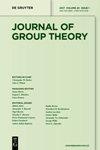On finite 𝜎-tower groups
IF 0.5
3区 数学
Q4 MATHEMATICS
引用次数: 1
Abstract
Abstract In this paper, 𝐺 is a finite group and 𝜎 a partition of the set of all primes ℙ, that is, σ = { σ i ∣ i ∈ I } \sigma=\{\sigma_{i}\mid i\in I\} , where P = ⋃ i ∈ I σ i \mathbb{P}=\bigcup_{i\in I}\sigma_{i} and σ i ∩ σ j = ∅ \sigma_{i}\cap\sigma_{j}=\emptyset for all i ≠ j i\neq j . If 𝑛 is an integer, we write σ ( n ) = { σ i ∣ σ i ∩ π ( n ) ≠ ∅ } \sigma(n)=\{\sigma_{i}\mid\sigma_{i}\cap\pi(n)\neq\emptyset\} and σ ( G ) = σ ( | G | ) \sigma(G)=\sigma(\lvert G\rvert) . A group 𝐺 is said to be 𝜎-primary if 𝐺 is a σ i \sigma_{i} -group for some i = i ( G ) i=i(G) and 𝜎-soluble if every chief factor of 𝐺 is 𝜎-primary. We say that 𝐺 is a 𝜎-tower group if either G = 1 G=1 or 𝐺 has a normal series 1 = G 0 < G 1 < ⋯ < G t - 1 < G t = G 1=G_{0}有限的𝜎-tower群
摘要:𝐺是一个有限群,而φ是所有素数集合的一个划分,即σ = { σ i∣i∈i } \sigma={\sigma_{I}\mid I\in I},其中P =∈I σ I \mathbb{P}=\bigcup_{I\in I}\sigma_{I} σ I∩σ j =∅ \sigma_{I}\cap\sigma_{j}=\emptyset 对于所有I≠j I\neq J。如果𝑛是整数,我们写∑∑(n) = { σ I∣σ I∩π≠∅ } \sigma(n)={\sigma_{I}\mid\sigma_{I}\cap\pi(n)\neq\emptyset}和σ _ (G) = σ _ (| G |) \sigma(g)=\sigma(\lvert g\rvert) . 如果𝐺是σ i,则称群𝐺为𝜎-primary \sigma_{I} -group对于i=i∑(G) i=i(G)和𝜎-soluble如果𝐺的每个主因子都是𝜎-primary。我们说𝐺是一个𝜎-tower群,如果G=1 G=1或𝐺有一个正规级数1= g0 < g1 <⋯< gt - 1 < gt = g1 =G_{0}< g_{1}<\cdots< g_{t-1}< g_{t}=G使得g1 / g1 - 1g_{I}/ g_{i-1} 是σ I \sigma_{I} -group, σ i∈σ≠(G) \sigma_{I}\in\sigma(G), G/G i G/G_{I} g1 - 1g_{i-1} σ I ' \sigma_{I}^{\prime} -group for所有I =1,…,t I =1,\ldots,t。如果存在子群链A=A 0≤A 1≤⋯≤A t = G A=A_,则称𝐺中的一个子群的变量为𝜎-subnormal{0}\leq a……{1}\leq\cdots\leq a……{t}=G使得A i - 1∑⊴∑A i a__{i-1}\trianglelefteq a……{I} 或者A i / (A i - 1) A i A_{I}/(a){i-1}){a……{I}} 是𝜎-primary对于所有I =1,…,t I =1,\ldots,t。在本文中,[A. N.]Skiba,关于有限群的𝜎-subnormal和𝜎-permutable子群,[j] .代数436(2015),1 - 16,证明了一个𝜎-soluble群G≠1g\neq 1,∑∑(G) | = n \lvert\sigma(g)\rvert如果=n的每一个(n+1) (n+1)极大子群都是𝐺中的𝜎-subnormal,则=n是一个𝜎-tower群。
本文章由计算机程序翻译,如有差异,请以英文原文为准。
求助全文
约1分钟内获得全文
求助全文
来源期刊

Journal of Group Theory
数学-数学
CiteScore
1.00
自引率
0.00%
发文量
45
审稿时长
6 months
期刊介绍:
The Journal of Group Theory is devoted to the publication of original research articles in all aspects of group theory. Articles concerning applications of group theory and articles from research areas which have a significant impact on group theory will also be considered.
Topics:
Group Theory-
Representation Theory of Groups-
Computational Aspects of Group Theory-
Combinatorics and Graph Theory-
Algebra and Number Theory
联系我们:info@booksci.cn
Book学术提供免费学术资源搜索服务,方便国内外学者检索中英文文献。致力于提供最便捷和优质的服务体验。
Copyright © 2023 布克学术 All rights reserved.
京ICP备2023020795号-1
 京公网安备 11010802042870号
京公网安备 11010802042870号
京ICP备2023020795号-1

Book学术文献互助群
群 号:604180095

 求助内容:
求助内容: 应助结果提醒方式:
应助结果提醒方式:
